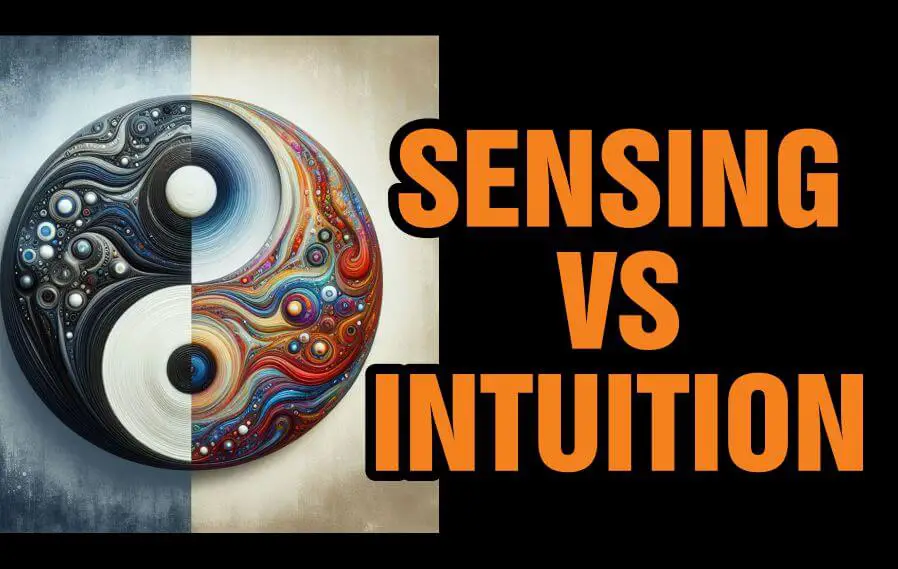Sensing vs intuition reveals how you absorb information, through facts or patterns. Here is how these styles shape your reality, influence decisions, and impact your relationships and self-awareness.
Two people can experience the same moment and walk away with entirely different takeaways.
One notices the physical details: the colors, the sounds, the exact words spoken.
The other walks away thinking about the meaning behind it all, patterns it fits into, or what it might mean down the line.
This difference comes down to how you naturally perceive the world: Sensing vs Intuition.
It shapes how you gather information, what you trust, and how your mind connects the dots.
You may rely on what you can see and touch, or you may be drawn to what lies beneath the surface.
Neither is better, but they do pull you in different directions.
Understanding this split can give you clarity in your thinking, your learning style, and how you relate to others.
Core Differences Between Sensing and Intuition
While Sensing emphasizes real-time, observable facts, Intuition zeroes in on underlying patterns and what could be.
These preferences deeply influence how we make decisions, learn, and experience daily life.
Sensing: Focus on Present, Concrete Data, and Tangible Reality
Sensing types are grounded in what’s real, factual, and immediately observable.
They notice details, rely on experience, and trust their five senses.
Their strength lies in practicality and living in the moment.
Whether at work or in relationships, Sensors tend to prefer step-by-step logic, proven methods, and clearly defined facts over speculation.
Intuition: Focus on Patterns, Abstract Ideas, and Future Possibilities
Intuitive types look beyond the surface, seeking connections, meanings, and emerging trends.
They often “read between the lines,” interpreting how present details relate to bigger ideas or long-term outcomes. Intuitives favor imagination, theory, and innovation.
Their thinking is future-oriented and symbolic, often valuing possibility over certainty or what’s physically in front of them.
Perception Styles and How They Influence Daily Life
Sensing and Intuition affect everything from learning styles to problem-solving approaches.
Sensors thrive with hands-on learning, clear instructions, and practical tasks. Intuitives prefer open-ended exploration, metaphorical language, and visionary goals.
Understanding your perception style can enhance self-awareness, communication, and decision-making, especially in navigating relationships, careers, and personal growth.
Related Posts
- Understanding Sensory Experience
- Tips on Harnessing the Powers of Introverted Intuition
- Signs and Examples of Extraverted Intuition
- Consequences of Ignoring Your Intuition
- How to Tap into Your Intuition
- Understanding Claircognizance
- What are Body Intelligence and Physical Intuition?
- How Personality is Developed
Sensing vs Intuition: A Side-by-Side Comparison

When examining the differences between sensing and intuition, it is beneficial to create a clear comparison.
Each cognitive function has unique characteristics that define how individuals perceive and interact with the world around them.
Below is a detailed comparison table that highlights critical factors in both senses.
| Factor | Sensing | Intuition |
|---|---|---|
| Focus | Present Moment | Future Possibilities |
| Memory Style | Specific Details | Impressionistic Overview |
| Information Gathering Method | Sensory Input | Insights and Patterns |
| Preferred Learning Style | Step-by-Step Processes | Conceptual Understanding |
| Decision-Making Approach | Fact-Based | Intuition-Based |
| Interaction with Reality | Practical and Concrete | Theoretical and Abstract |
How These Preferences Show Up in Real Life
The difference between Sensing and Intuition doesn’t just stay in the realm of personality theory, it plays out in everyday situations.
From how we work and communicate to how we make decisions, these cognitive preferences color our behaviors, priorities, and even our blind spots.
Here’s how they manifest in real-world contexts.
Work Style: Sensing Prefers Practical Methods, Intuition Prefers Innovation
In professional settings, Sensing types often stick to proven systems and established protocols.
They value reliability, clarity, and efficiency. Intuitive types, on the other hand, crave innovation and conceptual problem-solving.
They may propose bold ideas or overhaul workflows.
For example, a Sensor might perfect an existing product, while an Intuitive colleague reimagines the entire product line.
Relationships: Communication Differences and Misunderstandings
Sensing individuals often communicate in straightforward, literal language and may value talking about daily experiences.
Intuitives tend to speak abstractly, use metaphors, or jump to big-picture ideas.
This can lead to misunderstandings, Sensors may feel Intuitives “talk in riddles,” while Intuitives may find Sensors too focused on minutiae.
Awareness helps bridge this communication gap.
Decision-Making: Sensory Caution vs. Intuitive Leaps
When faced with decisions, Sensing types typically rely on past experiences and observable facts.
They take cautious, logical steps. Intuitive types are more comfortable making intuitive leaps or following gut feelings about future potential.
A Sensor might wait for more data before investing, while an Intuitive might trust a vision of what could evolve.
Examples or Mini-Case Studies for Each
Imagine two coworkers launching a project: the Sensor ensures timelines, resources, and execution steps are well-managed.
The Intuitive focuses on big-picture branding and possible future spin-offs.
In a relationship, a Sensor might prioritize shared routines, while an Intuitive wants deep philosophical talks.
Both styles offer strengths, especially when balanced with mutual respect and collaboration.
Strengths and Blind Spots
Both Sensing and Intuitive types bring essential strengths to the table, shaping how they process information, solve problems, and relate to the world.
However, each approach also comes with natural blind spots.
Understanding these areas helps individuals grow by embracing complementary perspectives and developing more balanced decision-making and awareness.
Strengths of Sensing Types
Sensing types excel in the practical and tangible.
They are grounded in the present moment and have a strong awareness of their environment.
Their attention to detail and ability to follow through makes them dependable in both work and personal settings.
They’re often excellent at maintaining systems, recalling relevant facts, and ensuring accuracy. Their realism keeps plans grounded.
Strengths of Intuitive Types
Intuitive types shine when it comes to envisioning future possibilities and connecting abstract ideas.
They can take seemingly unrelated information and uncover deeper meanings or creative insights.
Their visionary thinking often leads to innovative solutions and long-term strategies.
Intuitives bring energy to brainstorming and are adept at anticipating trends and imagining different outcomes that others might overlook.
Common Blind Spots and How Each Type Can Stretch Themselves
Sensing types may resist change or overlook abstract patterns that could lead to innovation.
They can stretch by exploring “what if” scenarios and entertaining unfamiliar concepts.
Intuitive types, on the other hand, may struggle with follow-through or neglect practical steps.
They grow by grounding their ideas in reality and paying attention to details.
Both benefit from integrating each other’s strengths.
Compatibility and Conflict: When Sensing Meets Intuition
When sensing and intuition come together in relationships, whether personal or professional, they bring complementary strengths that can lead to dynamic growth or frustrating misunderstandings.
Understanding each other’s information-processing style is key to reducing friction and building mutual respect through open communication and flexibility.
What Each Type May Admire in the Other
Sensing types often admire the imaginative scope and future-minded vision of Intuitives.
They may appreciate how Intuitive types bring fresh perspectives, explore new possibilities, and challenge assumptions.
Meanwhile, Intuitives may admire the grounded realism and reliability of
Sensors, finding comfort in their practical approach and trust in their ability to handle concrete needs efficiently and attentively.
Typical Friction Points
Conflict often arises from different priorities: Sensors may feel Intuitives are too abstract, impractical, or scattered, while Intuitives may find
Sensors too rigid, stuck in the present, or resistant to change.
Miscommunication is common when one speaks in factual terms while the other talks in metaphors or big-picture concepts, leading both to feel misunderstood or dismissed.
Tips for Bridging the Gap
Bridging the gap starts with respect and curiosity. Sensors can stretch by entertaining abstract ideas without immediate practicality.
Intuitives benefit from slowing down to clarify steps and listen to present realities.
Using clear, flexible communication, asking clarifying questions, and showing appreciation for the other’s perspective helps both sides find common ground and work in harmony.
Can You Be Both?
While everyone can use both Sensing and Intuition to some degree, personality theory suggests that one tends to be naturally dominant.
However, life experiences, personal growth, and changing circumstances often require developing and using the less preferred mode of perception over time.
Clarifying That While People May Use Both Functions, One Tends to Dominate
Most individuals have a clear preference for either Sensing or Intuition, shaped by their personality type.
This preference influences how they naturally take in information, either through real-time details or through abstract patterns.
However, that doesn’t mean they can’t use the opposite mode.
Just as someone might write with their non-dominant hand in a pinch, they can tap into the opposite function when needed, but it typically requires more effort and isn’t as instinctive.
Development of the Less Preferred Function Over Time
As people mature, especially into midlife and beyond, they often begin to balance their dominant function by developing the less preferred one.
A Sensor might begin to enjoy theoretical thinking, while an Intuitive may find satisfaction in practical routines.
This development leads to increased flexibility, better problem-solving, and a more holistic view of the world, enhancing personal and professional relationships.
How Situational Demands May Call Forth the Opposite Preference
Sometimes, life demands we operate outside our natural comfort zone.
A Sensor in a strategic leadership role may need to lean into future forecasting and abstract planning.
Likewise, an Intuitive working on a hands-on project must focus on details and step-by-step execution.
When the situation calls for it, even a less developed function can rise to meet the challenge, especially when practiced consciously over time.
Frequently Asked Questions
Can a person use both Sensing and Intuition?
Yes, everyone uses both, but one tends to be dominant and more natural depending on your personality type and current situation.
How does Sensing vs Intuition affect learning?
Sensing types prefer hands-on experience and facts, while Intuitive types thrive on concepts, possibilities, and abstract thinking when processing new information.
Is one better than the other in decision-making?
Not at all. Sensing and Intuition offer different strengths. The best decisions often come from balancing both perspectives where possible.
Can Intuition be developed like Sensing?
Yes. With awareness and practice, you can strengthen your non-dominant function through exercises, reflection, and intentionally shifting your attention.
Conclusion
Knowing whether you lean toward Sensing or Intuition isn’t about labels.
It’s about understanding how you naturally interact with the world and how others may differ.
These posts give you tools to go deeper: from tapping into intuition and understanding physical awareness to exploring introverted and extraverted cognitive functions.
Each link builds on the foundation of how you perceive, decide, and grow.
Whether you trust your senses or your gut, self-awareness opens the door to better choices, stronger connections, and clearer direction.
Use these insights to reflect, adjust, and grow at your pace.
Keep learning, your perception style is just one part of a much bigger picture.
Dive in and keep discovering what makes you think, feel, and respond the way you do.
References
- https://www.truity.com/blog/myers-briggs/sensing-vs-intuition
- https://personalityatwork.co/personality/sensing-vs-intuitive
- https://artoflivingretreatcenter.org/blog/how-to-tell-the-difference-between-intuition-and-sensing/
- https://showit.com/business-growth/know-who-you-are-sensing-and-intuition/
Pyo Merez (PsyD) is a distinguished adolescent and adult psychologist at the forefront of mental health advocacy.
With expertise in cognitive and developmental psychology, focusing on social relationships, cultural contexts, and individual differences, Pyo has dedicated his career to empowering adolescents and adults.
As a sought-after speaker and panelist, Pyo shares invaluable insights on issues affecting young people, contributing to a deeper understanding of mental health and well-being in today's society.

